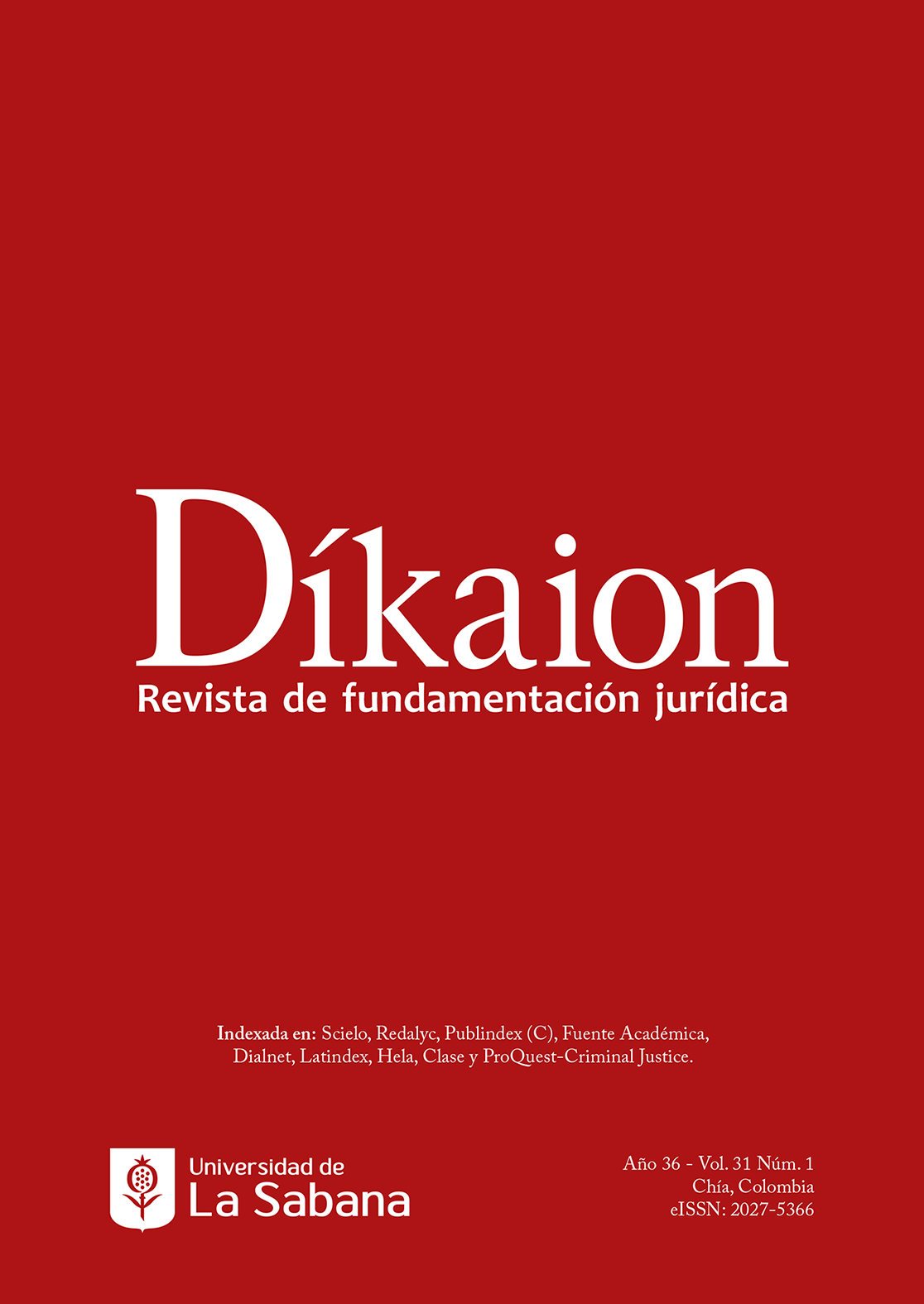What Is Judicial Activism? Part I. Desiderata for a Definition of Judicial Activism
DOI:
https://doi.org/10.5294/dika.2022.31.1.4Keywords:
Parochialism, morality in law, common law, modification of competenceAbstract
This writing is divided into two parts and, in a few words, is a work on the concept of judicial activism. Specifically, it defines judicial activism from a particular norms of competence theory formulated by Eugenio Bulygin, who explains norms of competence from the constituent rules. So, we propose that judicial activism is the intentional modification of competence by the judge through his decisions. It was necessary to divide the writing into two parts to reach this result. This article presents the first part, which summarizes the main theories on judicial activism and then assesses the theories on judicial activism from individual and general criticisms. Consequently, we propose the desiderata that a definition of judicial activism must meet.
Downloads
References
Canon, B. C., “Defining the dimensions of judicial activism”, Judicature 66, 5 (1983), pp. 236-247.
Congreso de la República, Ley 472, 1998. Constitución Política de Colombia, 1991.
Cross, F. B. y Lindquist, S. A., “The scientific study of judicial activism”, Minnesota Law Review 91, 6 (2007), pp. 1752-1784.
de Almeida Ribeiro, G., “Judicial activism and fidelity to law”, en Luís Pereira Coutinho, Massimo La Torre, Steven D. Smith (eds.). Judicial Activism: An Interdisciplinary Approach to the American and European Experiences, Cham, Springer International Publishing, 2015 (Ius Gentium: Comparative Perspectives on Law and Justice), pp. 31-46, en https://doi.org/10.1007/978-3-319-18549-1_4.
Escobar Torres, S. y L. M. Hernández Vargas y C. M. Salcedo Franco, “El juez constitucional como garante de los derechos sociales en Colombia una mirada crítica al activismo judicial de la Corte Constitucional Colombiana”, Universitas Estudiantes 10 (2013), pp. 121-151.
Garner, B. A. (ed.), “Judicial activism”, Black’s law dictionary.
Gómez Pinto, L. R., El juez de las políticas públicas, Bogotá, Pontificia Universidad Javeriana - Ibáñez, 2012.
Harwood, S., “Judicial activism: A restrained defense”, New York, Cornell University, 1992.
Holland, K. M., “Introduction”, en Kenneth M. Holland (ed.), Judicial Activism in Comparative Perspective, London, Palgrave Macmillan UK, 1991, pp. 1-11, DOI: https://doi.org/10.1007/978-1-349-11774-1_1
Itoh, H., “Judicial activism in Japan”, en Kenneth M. Holland (ed.), Judicial Activism in Comparative Perspective, London, Palgrave Macmillan UK, 1991, pp. 189-201, fecha de consulta: 2 de agosto de 2020, DOI: https://doi.org/10.1007/978-1-349-11774-1_11
Itoh, H., “Judicial review and judicial activism in Japan the Constitution of Japan - The fifth decade: III. Judicial Review”, Law and Contemporary Problems 53, 1 (1990), pp. 169-180. DOI: https://doi.org/10.2307/1191835
Jacobsohn, G. J., “Judicial activism in Israel”, en Kenneth M. Holland (ed.) Judicial Activism in Comparative Perspective, London, Palgrave Macmillan UK, 1991, pp. 90-116. DOI: https://doi.org/10.1007/978-1-349-11774-1_6
Kmiec, K. D., “The origin and current meanings of ‘judicial activism’”, California Law Review 92, 5 (2004), pp. 1441-1478. DOI: https://doi.org/10.2307/3481421
Landau, D., “Political institutions and judicial role in comparative constitutional law”, Harvard International Law Journal, 2010.
Lozada, A., “Activismo judicial y derechos sociales: un enfoque postpositivista”, Doxa. Cuadernos de Filosofía del Derecho, 41 (2018), pp. 211-226. DOI: https://doi.org/10.14198/DOXA2018.41.11
Maraniello, P. A., “El activismo judicial, una herramienta de protección constitucional”, Tla-melaua: revista de ciencias sociales, 5, 32 (2012), pp. 46-83. DOI: https://doi.org/10.32399/rtla.7.32.25
Marshall, W. P., “Conservatives and the seven sins of judicial activism”, University of Colorado Law Review 73 (2002), p. 1217. DOI: https://doi.org/10.2139/ssrn.330266
Muñoz Machado, S. (ed.), “Activismo judicial”, Diccionario panhispánico del español jurídico, vol. 1 A-F.
Pulido Ortiz, F. E., “‘Rule of law’ y activismo judicial”, Ámbito Jurídico, 2019, en https://www.ambitojuridico.com/noticias/analisis/constitucional-y-derechos-humanos/rule-law-y-activismo-judicial.
Rodríguez, M., Minorías, acción pública de inconstitucionalidad y democracia deliberativa, Universidad Externado de Colombia, Bogotá, 2005.
Saffon, M. y García-Villegas, M., “Derechos sociales y activismo judicial: la dimensión fáctica del activismo judicial en derechos sociales en Colombia”, Estudios Socio-Jurídicos 13, 1 (2011), pp. 75-107.
Schlesinger, A. M., “The Supreme Court”, Fortune XXXV (1) (1947), pp. 73-204.
Schubert, G., “Judicial policy making: The political role of courts”, en David Forte (ed.), The Supreme Court in American politics: Judicial Activism vs. Judicial Restraint (Problems in Political Science), Heath, 1965, pp. 131-135.
Smith, S. D., “Judicial activism and ‘reason’”, en Luís Pereira Coutinho, Massimo La Torre, Steven D. Smith (eds.), Judicial Activism: An Interdisciplinary Approach to the American and European Experiences, Cham, Springer International Publishing, 2015 (Ius Gentium: Comparative perspectives on law and justice), pp. 21-30. DOI: https://doi.org/10.1007/978-3-319-18549-1_3
Stone, G. R., “Selective judicial activism”, Texas Law Review 89 (2011), pp. 1423-1431.
Terpan, F. y Saurugger, S., “Assessing judicial activism of the CJEU the case of the court’s defence procurement rulings”, Journal of European Integration, 2018, pp. 1-19. DOI: https://doi.org/10.1080/07036337.2018.1537268
Waltman, J., Principled Judicial Restraint: A Case Against Activism, New York, Palgrave Pivot, 2015. DOI: https://doi.org/10.1057/9781137486967
Young, K. G., “A typology of economic and social rights adjudication: Exploring the catalytic function of judicial review”, International Journal of Constitutional Law 8, 3 (2010), pp. 385-420. DOI: https://doi.org/10.1093/icon/moq029
Zarbiyev, F., “judicial Activism in International Law—A conceptual framework for analysis”, Journal of International Dispute Settlement 3 (2) (2012), pp. 247-278. DOI: https://doi.org/10.1093/jnlids/ids005
Published
How to Cite
Issue
Section
License
Copyright (c) 2022 Díkaion

This work is licensed under a Creative Commons Attribution-ShareAlike 4.0 International License.
1. Proposed Policy for Journals That Offer Open Access
Authors who publish with this journal agree to the following terms:
This journal and its papers are published with the Creative Commons License Attribution-NonCommercial-NoDerivatives 4.0 International (CC BY-NC-ND 4.0). You are free to share copy and redistribute the material in any medium or format if you: give appropriate credit, provide a link to the license, and indicate if changes were made; don’t use our material for commercial purposes; don’t remix, transform, or build upon the material.










